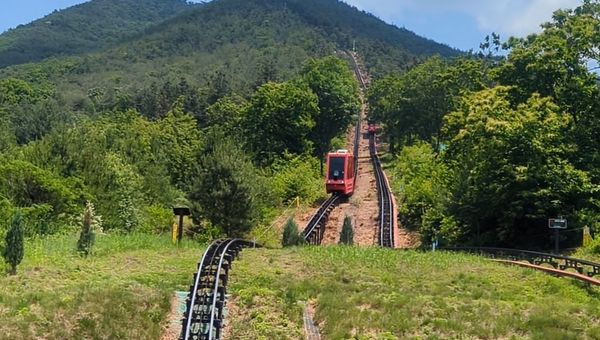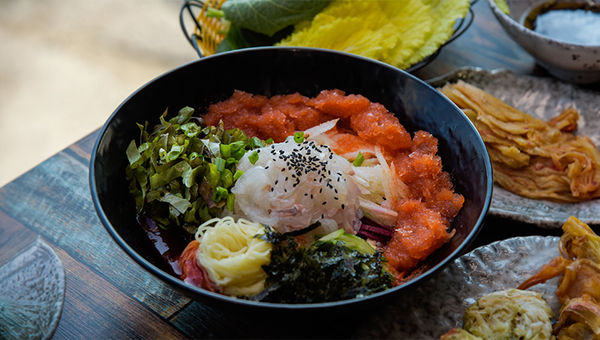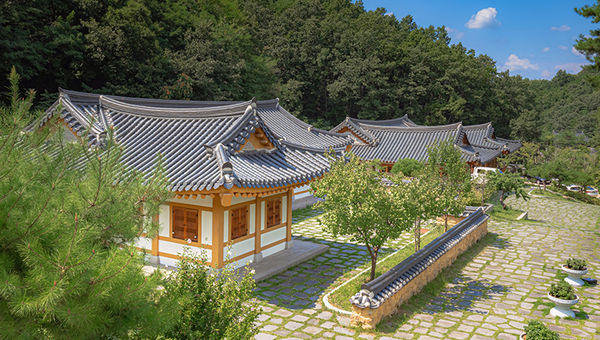There’s no doubt about it: travellers are spending more on experiences,
and are even looking toward lesser-known destinations. For tourists
seeking a more immersive experience in South Korea, the province of
Gyeongsangbuk-do (Gyeongbuk for short) is the perfect place to start.
Besides being conveniently located between Busan and Seoul, the
province is home to 20% of South Korea's cultural assets, mountain
ranges, and 537km of coastline. Here are the essential experiences
travellers should add to their South Korean bucket list:
Get hands-on with Korean culture

Andong Hanji Paper Factory offers immersive guided tours, allowing visitors to observe the intricate traditional paper-making process and create their own unique Korean paper sheets.
Renowned for its durability, Hanji (Korean paper) is the choice of medium for Korean artists. There are only about 20 traditional hanji mills remaining in the country, and hanji
from Andong is considered to be of excellent quality. At Andong Hanji
Paper Factory, visitors can tour the facility to witness the intricate
traditional paper-making process firsthand and even partake in the
creation of their own unique sheets of Korean paper.
Tourists can also experience a Korean tea ceremony — which is vastly
different from a Japanese one — at several tourist attractions with
traditional tea houses, including the Gyeongju Gyochon Traditional
Village and the Mungyeong Saejae Open Film Set.
Feel the adrenaline rush

Opened in 2020, the Mungyeong Dansan Tourist Monorail offers a thrilling ascent up Mount Dan.
Outdoors enthusiasts and thrill-seekers are spoilt for choice in
Gyeongbuk, with options for hiking, camping, and even paragliding in the
mountains. The Mungyeong Dansan Tourist Monorail, newly opened in 2020,
takes visitors on a slow but steep climb up Mount Dan, with parts of
the monorail sloped at 45°. While sightseers will be mesmerised by the
vistas, the mountain also boasts an observatory, paragliding site,
outdoor adventure park, campsites, and more.
Along Gyeongbuk’s cerulean coast, tourists have the opportunity to
explore the Gyeongbuk Donghaean Geopark and its geosites, including the
12 Waterfalls of Mt. Naeyeonsan in Pohang and Seongryugul Cave, a
massive limestone cave in Uljin County. The East Coast Gyeongbuk Bicycle
Path, which hugs the coast, offers a challenging ride for seasoned
cyclists.
Savour gastronomic delights

Mulhoe is a refreshing "soup" of raw fish and glass noodles in icy red pepper broth.
Surrounded by mountains and sea, Gyeongbuk’s harvest of local
ingredients is especially adaptable to various dietary requirements,
such as for Muslim and vegetarian travellers. Pohang, for one, offers
some of the freshest seafood in South Korea at prices lower than Seoul
or Busan. Adventurous foodies can try grilled hagfish, a popular local
delicacy, as well as mulhoe, a “soup” of raw fish and glass noodles in ice-cold red pepper broth.
In locales further inland, traditional Korean vegetable dishes take the spotlight. Andong’s heotjesatbap
(bibimbap with soy sauce), which was eaten by scholars during the
Joseon dynasty, features seasoned wild greens and young vegetables on
rice, which is then mixed with soy sauce. The city is also known for Andong jjimdak, a spicy braised chicken dish.
Stay in style

Experience the charm of traditional Korean living at Andong's 4-suite Gurume, where hanok-style accommodations provide an authentic and immersive cultural encounter.
Gyeongbuk’s bigger cities are well-served by local hotel chains, such
as the upscale Lahan Hotels and mid-range Commodore Hotels in Pohang
and Gyeongju. International brands include the Hilton Gyeongju, as well
as the Daegu Marriott Hotel and Toyoko Inn Dongseongno in nearby Daegu.
When it comes to smaller groups or luxury travel, a burgeoning
selection of independent hotels promises enchanting, exclusive
accommodation experiences: hanok (traditional Korean houses)
like the 4-suite Gurume in Andong offer a taste of traditional Korean
living, while specially designed holiday homes like Stayumok, along
Pohang’s seaside, boast unbeatable views and amenities like indoor hot
tubs.
Travel with ease
The closest international airport to Gyeongbuk is Daegu International
Airport; direct flights are available from Taipei, Bangkok, and Cebu,
as well as multiple cities in Vietnam, China, and Japan. The next
closest airport is Gimhae International Airport in Busan, which is 1.5-2
hours’ drive from the province.
Regular and high-speed rail services are available to cities like
Andong, Gyeongju, and Pohang. However, transfers are required when
travelling from Seoul or Busan and thus, driving along the province’s
well-developed highway network is the best option for tour groups.
Amidst an unprecedented surge in tourist arrivals, with a staggering
400% year-on-year increase in foreign visitors to South Korea in January
and February 2023, the Korea Tourism Organization (KTO) is
strategically poised to achieve its ambitious objective of attracting 30
million international tourists by 2027. Bolstering their efforts is the
eagerly anticipated Visit Korea Year 2023-2024 campaign, a multifaceted
initiative that transcends the boundaries of the famed "Korean Wave."
Expanding its focus beyond contemporary culture, the campaign will
showcase the richness of Korean art, music, gastronomy, festivals, and
much more, offering a captivating and immersive experience for global
travellers.